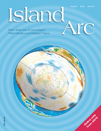
ISLAND ARC
Scope & Guideline
Connecting Scholars Through Geological Discoveries
Introduction
Aims and Scopes
- Tectonics and Geodynamics:
Research in this area explores the tectonic processes that shape island arcs, including subduction dynamics, plate interactions, and the resulting geodynamic implications for surrounding regions. - Magmatism and Petrogenesis:
This scope investigates the origins, evolution, and geochemical characteristics of volcanic and intrusive rocks associated with island arcs, providing insights into the magmatic processes at play. - Sedimentology and Paleoenvironmental Studies:
Studies that focus on sedimentary processes, depositional environments, and the paleoenvironmental implications of sedimentary records in island arc settings. - Geochronology and Isotope Geochemistry:
This area emphasizes the use of geochronological methods and isotopic analysis to date geological events and understand the evolution of island arcs through time. - Hydrothermal and Alteration Processes:
Research that delves into the hydrothermal systems associated with island arcs, including the alteration of rocks and the implications for mineralization. - Geophysical Investigations:
This includes the application of geophysical techniques to study the structure and composition of island arcs, contributing to a better understanding of their geological framework.
Trending and Emerging
- Subduction Zone Processes:
There is a growing focus on the complex interactions and processes occurring at subduction zones, particularly how they influence arc volcanism and tectonics. - Environmental Impacts of Volcanism:
Emerging studies increasingly address the environmental implications of volcanic activity in island arcs, including impacts on climate and local ecosystems. - Advanced Analytical Techniques:
The integration of advanced analytical techniques, such as high-resolution geochronology and isotopic studies, is becoming more prevalent, enhancing the understanding of geological processes. - Hydrothermal Systems and Mineralization:
Research on hydrothermal systems associated with island arcs and their role in mineralization processes is gaining traction, highlighting their economic significance. - Geophysical Imaging and Structural Analysis:
The application of geophysical methods to map and model the subsurface structures of island arcs is increasingly featured, offering new insights into their geological framework.
Declining or Waning
- Paleoclimatic Studies:
Research related to paleoclimatic reconstructions in island arc settings has seen a reduction in frequency, possibly due to a shift towards more tectonically oriented studies. - Fossil Record and Paleontology:
The exploration of fossil records, particularly in the context of island arc geology, has become less prevalent, indicating a potential waning interest in paleontological aspects. - Geochemical Modeling:
Although geochemical modeling remains important, publications specifically focusing on theoretical modeling without substantial empirical data appear to be decreasing. - Historical Geology:
Research on historical geological events in island arcs, while foundational, seems to be less frequently addressed compared to contemporary tectonic and magmatic studies.
Similar Journals
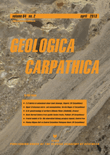
GEOLOGICA CARPATHICA
Fostering Innovation in Geological ResearchGEOLOGICA CARPATHICA, with ISSN 1335-0552 and E-ISSN 1336-8052, is a distinguished open access journal published by the Slovak Academy of Sciences Geological Institute, serving as a pivotal platform for the dissemination of research in the field of Geology. Established in 1991 and continuing through 2024, the journal is recognized for its significant contributions to Earth and Planetary Sciences, evidenced by its 2023 Scopus ranking placing it in the second quartile (Q2) within Geology. With an H-index that showcases its impactful publications, GEOLOGICA CARPATHICA is committed to fostering scholarly communication while promoting accessible research, having adopted an open access model since 2009. Located in beautiful Bratislava, Slovakia, this journal aims to engage a global audience of researchers, professionals, and students interested in ecological, geological, and environmental studies, making it a prominent resource for enriching the scientific community's understanding of the Carpathian region and beyond.
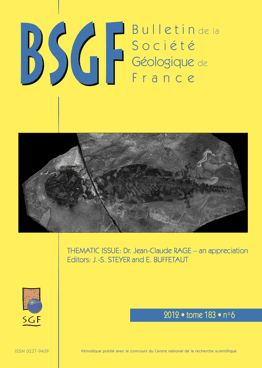
BSGF-Earth Sciences Bulletin
Advancing Knowledge in Geology and BeyondWelcome to the BSGF-Earth Sciences Bulletin, a premier open-access journal published by EDP SCIENCES S A that has been illuminating the field of earth sciences since its inception. With an ISSN of 0037-9409 and an E-ISSN of 1777-5817, this journal has established itself as a vital platform for disseminating significant research findings and innovative studies in Earth and Planetary Sciences. Operating out of France, BSGF is recognized for its rigorous peer-review process and its commitment to accessibility, having transitioned to open access in 2018. This stature is reflected in its outstanding rankings, placing it in the Q1 quartile within both Earth and Planetary Sciences and Geology disciplines, and ranking #35/195 overall in the Scopus database. Researchers, professionals, and students alike will find the BSGF invaluable for its high-impact articles, which span a wide array of sub-disciplines, addressing both foundational concepts and contemporary challenges in earth sciences.
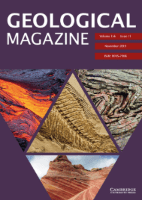
GEOLOGICAL MAGAZINE
Pioneering Discoveries in Earth and Planetary SciencesGEOLOGICAL MAGAZINE, published by Cambridge University Press, is a premier journal in the field of geology, renowned for its rich legacy since 1864 and ongoing contributions to Earth and Planetary Sciences. With an impressive Q1 ranking in Geology and a Scopus rank of #70 out of 321 journals, it holds a significant position within the academic community, appealing to researchers, professionals, and students alike. The journal covers a wide array of topics, ensuring a comprehensive platform for the dissemination of cutting-edge geological research. Although it does not offer open access, it remains a vital resource for those seeking to stay abreast of advancements in the field. With an enduring commitment to quality, GEOLOGICAL MAGAZINE stands as an essential outlet for scholarly communication and serves as a catalyst for academic discourse within the geological sciences.
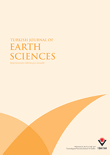
TURKISH JOURNAL OF EARTH SCIENCES
Elevating Earth Science Research to New HeightsTURKISH JOURNAL OF EARTH SCIENCES, published by the Tubitak Scientific & Technological Research Council Turkey, is a premier platform dedicated to advancing the field of Earth and Planetary Sciences. With an ISSN of 1300-0985, this journal has been a significant contributor to the international scientific community since its inception in 2002, and is set to continue publishing groundbreaking research through 2024. As a recognized journal in the Q2 quartile of Earth and Planetary Sciences, it ranks #98 out of 195 in its category according to Scopus metrics, positioning it within the 50th percentile of its field. The journal emphasizes peer-reviewed research, providing invaluable insights that facilitate scholarly discourse and promote rigorous investigation into various aspects of the Earth sciences. Although it does not currently offer open access, the journal remains a vital resource for academics, professionals, and students seeking to deepen their understanding of geological phenomena and contribute to the advancement of this essential discipline.
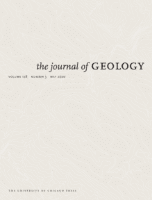
JOURNAL OF GEOLOGY
Unveiling Geological Insights for a Sustainable Future.The JOURNAL OF GEOLOGY, published by University of Chicago Press, serves as a premier platform for disseminating groundbreaking research in the field of geology. Established in 1973, this esteemed journal has consistently ranked in the Q2 category in geology, further solidified by its Scopus ranking, where it is positioned at 99 out of 321 in Earth and Planetary Sciences, marking it in the 69th percentile of its category. With an emphasis on innovative and interdisciplinary studies, the journal features peer-reviewed articles that contribute to the understanding of geological processes, earth materials, and environmental interactions. Although it does not currently offer open access, it facilitates broad access through academic institutions to reach a global audience of researchers, professionals, and students striving to advance the knowledge of Earth's history and dynamics. As a vital resource for the geology community, the JOURNAL OF GEOLOGY plays an essential role in fostering scholarly dialogue and advancing both academic inquiry and practical applications in geology.

Gondwana Research
Connecting Experts in Geological Science and InnovationGondwana Research is a premier academic journal published by Elsevier, specializing in the field of geology, with a robust focus on the geological history and processes of the Gondwana supercontinent. With an impressive impact factor and ranking as Q1 in the 2023 Geology category, it stands as a leading platform for disseminating high-quality research. The journal features articles that advance the understanding of Earth and planetary sciences, making significant contributions to geological education and research. Researchers will find its curated content particularly valuable, as it encompasses a wide array of topics including stratigraphy, paleontology, and tectonics, all relevant to both contemporary and historical geological inquiries. Given its substantial reach and esteemed standing—ranked 5th out of 321 in its field—Gondwana Research plays a crucial role in fostering scientific exchange among global experts. Located in the United States with publication continuity from 1997 to 2024, this journal consistently attracts submissions from leading scientists, ensuring that its readership is kept at the forefront of geological discovery and innovation.

ACTA PETROLOGICA SINICA
Connecting Researchers in the Earth SciencesACTA PETROLOGICA SINICA, published by SCIENCE PRESS, is a distinguished journal in the field of geochemistry and petrology, known for its commitment to advancing the understanding of Earth's materials and processes. With an impact factor ranking it in the second quartile (Q2) of its category and a respectable Scopus rank of 64 out of 154, this journal serves as a vital platform for researchers, professionals, and students alike, facilitating the dissemination of innovative studies and findings from 1980 to the present. Its robust editorial board and diverse array of articles make it an invaluable resource for those engaged in the intricate analysis of petrological phenomena and geochemical transformations. Published in China, ACTA PETROLOGICA SINICA provides access to significant original research, reviews, and insights essential for advancing knowledge and fostering collaboration in the earth sciences.
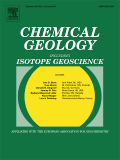
CHEMICAL GEOLOGY
Bridging Geochemical Research with Real-World ApplicationsChemical Geology is an esteemed international journal published by Elsevier, dedicated to the rigorous exploration of geochemistry and petrology, with its foundational roots tracing back to 1966. As evidenced by its impressive Q1 ranking in both Geochemistry and Petrology as well as Geology in the 2023 category quartiles, this journal stands as a premier outlet for cutting-edge research and innovative methodologies within these vital fields. With a Scopus rank placing it in the top 10% of Earth and Planetary Sciences, Chemical Geology offers a platform for researchers, professionals, and students alike to disseminate findings that advance our understanding of geological processes and materials. Although it does not currently offer open-access options, the journal remains committed to high-quality publications that contribute significantly to the scholarly community. Located in the vibrant academic milieu of Amsterdam, Netherlands, Chemical Geology is an essential resource for those engaged in the earth sciences, aiming to bridge theoretical insights with practical applications.

Journal of Earth Science
Exploring the depths of Earth and beyond.Journal of Earth Science, published by the China University of Geosciences, Wuhan, is a leading journal in the field of Earth and Planetary Sciences, recognized for its significant contributions to the understanding of geological processes and environmental challenges. With an impressive Q1 ranking among Earth and Planetary Sciences journals and a strong position at Rank #39/195 in Scopus, this journal not only showcases high-quality research but also serves as a crucial platform for disseminating innovative findings, spanning a broad spectrum of topics from geophysics to climate change. The journal adopts an open access model, which enhances the visibility and accessibility of research articles published from 2009 to 2024, thereby facilitating collaboration and knowledge sharing among the global scientific community. With its commitment to advancing geosciences, Journal of Earth Science is invaluable for researchers, professionals, and students alike, eager to stay informed and contribute to ongoing discussions in this dynamic field.
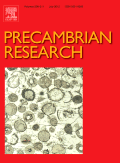
PRECAMBRIAN RESEARCH
Illuminating the Precambrian: Where Earth’s History BeginsPRECAMBRIAN RESEARCH is a leading peer-reviewed journal published by Elsevier, dedicated to advancing the field of Earth sciences, with a specific focus on the study of the Precambrian era. With its distinguished Q1 ranking in both Geochemistry and Petrology and Geology, this journal plays a critical role in disseminating high-impact research, thus contributing to its impressive standing, ranked in the top percentages in Scopus for related fields. Founded in 1974, the journal has evolved continually, ensuring comprehensive coverage of geological aspects spanning from geochemical processes to petrological studies. Researchers and students alike will find this journal indispensable for accessing cutting-edge findings, methodologies, and innovative perspectives essential for understanding the Earth’s formative years. Although it does not provide an open-access option, its subscription provides a gateway to a wealth of knowledge and groundbreaking research pivotal for scholarly advancements leading up to 2024.